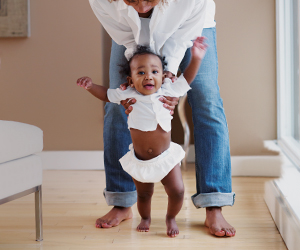The second you reveal your status as a new parent, others will weigh in with ‘foolproof’ advice. But what should be explored and what should be expelled? Ciska Thurman does some digging
 Parenting trends often gather momentum in Tinseltown. Celebrities will flaunt the latest fad and gather even more notoriety. Below are three parenting approaches straight out of Hollywood that have received much publicity.
Parenting trends often gather momentum in Tinseltown. Celebrities will flaunt the latest fad and gather even more notoriety. Below are three parenting approaches straight out of Hollywood that have received much publicity.
Does one need money, time and fame to practise these methods, or are there some practical elements other parents can adopt?
Rie
Tobey Maguire, Jamie Lee Curtis, Helen Hunt, and Felicity Huffman and husband William H Macy have all practised something called Rie (Resources for Infant Educarers) with their children. This back-to-basics approach substitutes the fast-paced and achievement-oriented style for a more baby-centred, relaxed and calm one.
Rie generally involves rejecting the mainstream notion that kids need constant stimulation, and instead aims to show respect for a baby’s experience. ‘Do less, observe more’ is Rie’s unofficial mantra. The other principles include:
• Avoiding overloading children with extramural activities from a young age
• ‘Socialising’ them at baby classes
• Shunning traditional parenting paraphernalia such as prams, high chairs, battery-operated toys and playpens. Simplicity is key (everyday objects such as jars and wooden spoons stimulate imagination and motor skills)
• Rituals, such as narrating actions around your baby – explaining new faces, the movement from room to room or what’s happening during a nappy change (which gives your baby a thinking and feeling part in what you’re doing to or for them).
Jane de Waal, proud mother to Christopher, four, and Leah, two, weighs in: ‘There is some value in the non-pressurised aspect of this approach. But maintaining baby’s peacefulness at all costs really is impractical for the average parent these days.’
Elimination Communication (EC)
Supermodel Gisele Bündchen actively promotes this baby-led potty-training method, also known as nappy-free parenting. It relies on parents responding to their infant’s needs as and when they occur, rather than waiting until it is time to change their nappy. From birth, parents start looking for cues that communicate baby’s elimination needs (a particular wriggle or facial expression) and then hold them in a squat position, hands underneath their thighs, with baby’s back and head leaning against the parent’s chest. An older child can sit on a potty or toilet insert. Baby can then use the potty or lavatory instead of a nappy.
The idea is that your baby will learn to associate the hold and place with their bodily functions. What starts with keenly observant parents and lucky timing, moves into a more conscious act on the part of your baby. Some parents make a ‘psss’ sound or a grunting noise, which assists the baby in making this connection.
Parents can use EC full-time or practise this method for a couple of hours each day. It can be used in conjunction with cloth nappies (out and about) and disposable nappies (during the night).
David Weliso, father to Lebo, five, loves that EC is a landfill-reducing, green solution to the planet’s waste woes. ‘But what parent has the time (and the energy) to be attuned
to their little one’s every wriggle? Sounds like these parents will be investing in a lot more cleaning chemicals anyway.’
Premastication
Actress Alicia Silverstone created huge controversy in 2012 when she posted a video on her blog showing her ‘kiss feeding’ her then 11-month-old son Bear Blu. Pre-chewing adult food,then feeding it to your infant, mouth-to-mouth (like a bird), is a technique called premastication. This method is used to supplement breastfeeding during the weaning process (the move from breast milk to solid food).
Babies start requiring non-milk food in their diet from six months old, yet only develop the molars they need to chew most food between the ages of 18 and 24 months. Pre-chewing an infant’s food is a traditional method of feeding considered healthy by a number of non-Western cultures today and was in Western homes as well, before owning a blender became mainstream.
Supporters of premastication believe that the germs found in a mother’s mouth can help her baby’s immune system produce helpful antibodies. However, the sceptics express concern about the potential for the transmission of diseases.
Although premastication hasn’t quite enjoyed the renaissance that breastfeeding has, some believe Alicia is ahead of the curve and this feeding technique will see a revival soon.
Catherine Miles, mother to Sam, 15, and Max, 12, says: ‘Perhaps the health benefits of premastication will be seen in the years to come, but modern-day parenting relies on a baby food industry as well as gadgets such as blenders – moms and dads simply cannot afford to be home all day long any more in this day and age.’







